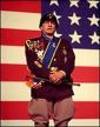General George S. Patton’s Principles of War Apply to Legal Trials
Alan Axelrod’s book Patton provides a picture of this complex military genius. I have noted General Patton before in this blog: 3/8/07 and 12/6/06. As I read this book, I see many of Patton’s principles of leadership and war which contain ideas that can be applied to trial lawyers and trials. Even though there is a modern abhorrence In the legal profession to compare trials to anything adversarial I think  the comparison is appropriate in light of the historical view of a trial. Trials were always intended to be adversarial proceedings with each side contesting for a ruling in their favor over the other side. The assumption was that truth will emerge from a contest between competing sides with a judge acting as neutral referee. Take one part of a trial -cross examination – which is intended to be an inherently adversarial process. As one leading legal scholar, John Wigmore, has written "cross examination is the greatest legal invention ever invented for discovery of the truth." A trial is a contest, pure and simple, between competing sides. The primary difference between a trial and war is that there are clear rules that apply to a trial and killing the other side is not an objective. So, given the historical purpose behind a trial, I think it is appropriate to examine Patton’s principles of leadership and war for possible application to trials. Here are some Patton principles & my comments about them:
the comparison is appropriate in light of the historical view of a trial. Trials were always intended to be adversarial proceedings with each side contesting for a ruling in their favor over the other side. The assumption was that truth will emerge from a contest between competing sides with a judge acting as neutral referee. Take one part of a trial -cross examination – which is intended to be an inherently adversarial process. As one leading legal scholar, John Wigmore, has written "cross examination is the greatest legal invention ever invented for discovery of the truth." A trial is a contest, pure and simple, between competing sides. The primary difference between a trial and war is that there are clear rules that apply to a trial and killing the other side is not an objective. So, given the historical purpose behind a trial, I think it is appropriate to examine Patton’s principles of leadership and war for possible application to trials. Here are some Patton principles & my comments about them:
- We can never get anything across unless we talk the language of the people we are trying to instruct [Trial lawyers must communicate clearly, simply and briefly in the language of the jury]
- Lead me, follow me or get out of my way [Great trial lawyers are leaders]
- Courage is fear holding on a minute longer [Learn to act in spite of fear & never give up]
- Take calculated risks [Courage includes taking calculated risks at trial]
- A good plan executed today is better than a perfect plan executed at some indefinite point in the future. Don’t delay. The best is the enemy of the good. By this I mean that a good plan, violently executed now, is better than a perfect plan next week. War is a very simple thing, and the determining characteristics are self confidence, speed and audacity. None of these things can be done perfectly, but all can be done well. [Taking advantage of opportunity when it first arises is essential.Waiting until you are perfectly prepared means lost opportunities. Innovative tactics executed with self confidence during a trial can be telling]
- Make your plans fit the circumstances [A trial is full of the unexpected – deal with it]
- In case of doubt, attack. We attackers have the imitative…We must retain this tremendous advantage by always attacking rapidly, ruthlessly, viciously and without rest. [Stay on the offense. Take advantage of opportunities when they arise & move quickly in doing so]
- In war the only sure defense is offense and the efficiency of the offense depends upon the warlike souls of those conducting it. [A good offense is always superior to a good defense]
- You must be single minded. Drive for the one thing you have decided. You will find that you will make some people miserable; those you love and very often yourself… [Single minded determination is the mark of great trial lawyers]
- May God have mercy upon my enemies – because I won’t. [No comment!]
